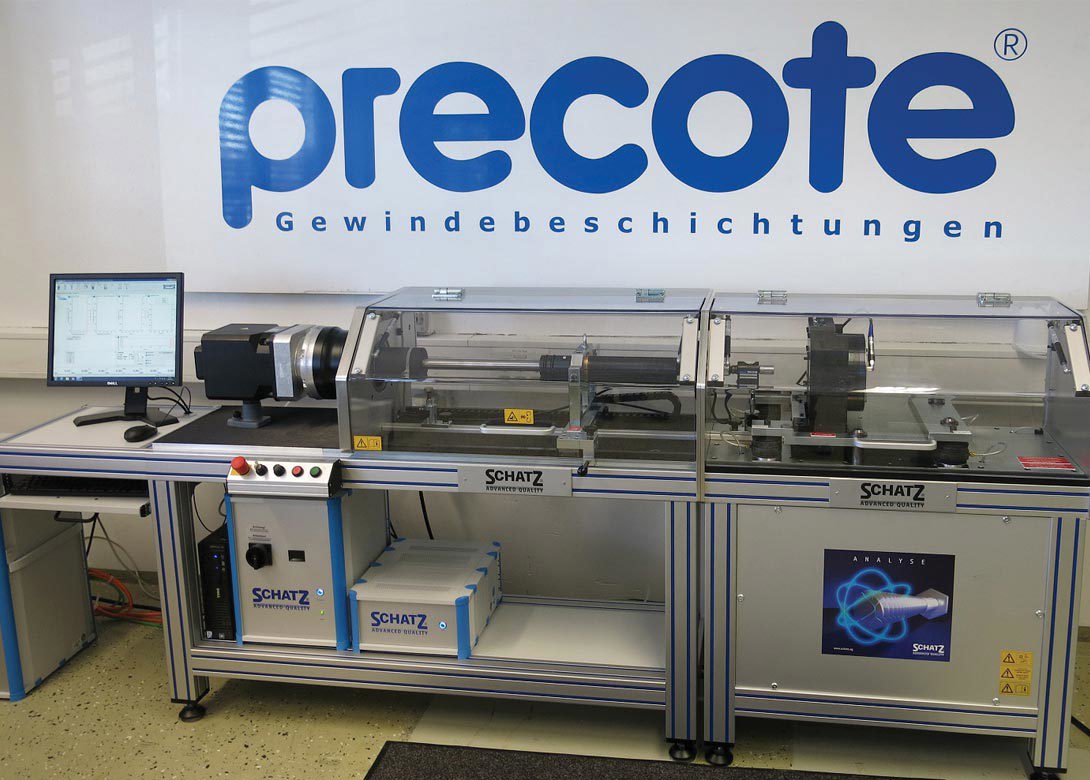Dynamic testing of the loosening of tightened screws
17 July 2015
omniTECHNIK Mikroverkapselungs GmbH, a manufacturer of pre-applied chemical thread-locking products – available worldwide under the trademark precote®, recently invested in a new vibration test bench, which allows dynamic testing of tightened screws under high transversal loads, according to DIN 65151.
Innovation, service and quality are all major components of omniTECHNIK’s corporate philosophy and in order to maintain its technological position the company consistently invests in product development as well as quality control.
omniTECHNIK has recently acquired a newly developed machine from German-based Schatz AG to test screw tightened joints under special dynamic conditions. Correctly dimensioned screwed joints should theoretically generate sufficient clamping force to prevent the assembled parts from any movement. In order to avoid breaking or loosening of the screw, the clamping force generated during assembly needs to be higher than the operational forces encountered in service. So in theory, high preload, as well as sufficiently high static friction, should prevent any sliding in the joint face.
However, due to design specifications it is not always possible to follow up the ideal principle of VDI 2230 to achieve a slip resistant joint. It is often impossible to use flexible screw joints with high clamp length ratio or fitting screws. Self-acting loosening – alongside material failure – remains today’s most common cause for failures of screw joints.
Especially in the automotive industry the lightweight construction principle requires the use of both smaller screws and softer materials with lower permissible preload, thus thread-locking technologies are increasingly used in this field.
Pre-applied chemical thread-lockers such as precote® provide a technically effective solution, as the additionally engaged area allows the adaption of the construction to modern requirements.
Economically designed screwed joints according to the operational forces require thread-locking systems as these protect against recurring extraordinary loads. In particular, when using the new chromium (VI) free surfaces with integrated lubricants, dynamic testing of the intended application is essential, as the reduction of friction between the assembled parts caused by lubricants can be enormous.
What are the reasons for loosening of screws?
The reasons for loosening of screws include:
• Loss of axial load due to creeping inside the specified materials.
• Settling caused by flattening of the surface roughness.
• Forced movement in the joint line whereby the internal self-loosening force will become bigger than the self-locking effect.
omniTECHNIK says that to avoid this self-acting loosening and maintain the preload, its thread locking systems, such as coating the screw with a microencapsulated adhesive, represent the ideal solution.
Resins released from microcapsules, which are ruptured during screw assembly, mix and polymerise in the thread tolerance gap. This creates higher static friction, which enables the joint to withstand significantly higher load peaks than the calculated operational forces. An additional benefit of all precote reactive products is a sealing effect.
Both the Junkers test (DIN 65151) and the Alma test (NASM 1312-7) were developed to test threaded joints and
thread-locking technologies under high dynamic loads. Trials at the Fachhochschule Köln, carried out on a Junkers tester, proved that precote reactive thread-locking withstands thousands of cycles without loss of preload.
The new Schatz vibration test rig introduced by omniTECHNIK consists of a drive unit with an adjustable stroke; a force measurement for the transversal force; a position measurement for the transversal stroke; and sensors for different screw sizes to measure preload and thread friction. This unit is directly coupled to a friction tester whereby all assembly processes such as torque, preload force, rotation angle or yield can be set and measured.
With this test bench, tests according to ISO 2320 or DIN 267-27 and 267-28 can be carried out so that the tightening torques are known before running the vibration test. As a result it is possible to perform different tests or installation methods, combined with a vibration test.
The objective of the Junkers test is to carry out a comparative test of the loosening behaviour of a screw with transverse movement under defined conditions and demonstrate the function of the used thread-locking technology. Since the parameters in DIN 65151 are not exactly defined, omniTECHNIK uses the requirements according to E DIN 25201-4.
These requirements include:
• Comparison between screw without locking technology and with precote reactive adhesive.
• Preload or installation torque.
• Test frequency 12.5Hz.
• Low clamping length ratio.
• Lubrication.
• Surface and hardness of the parts.
Measured values are the transverse stroke, preload, and the load cycles until failure of the threaded joints.
“Chemical thread-locking with precote reactive is the most reliable way to avoid the loosening in service of threaded assemblies. Our coating partners and technical service are able to answer questions about all applications concerning thread-locking.”

